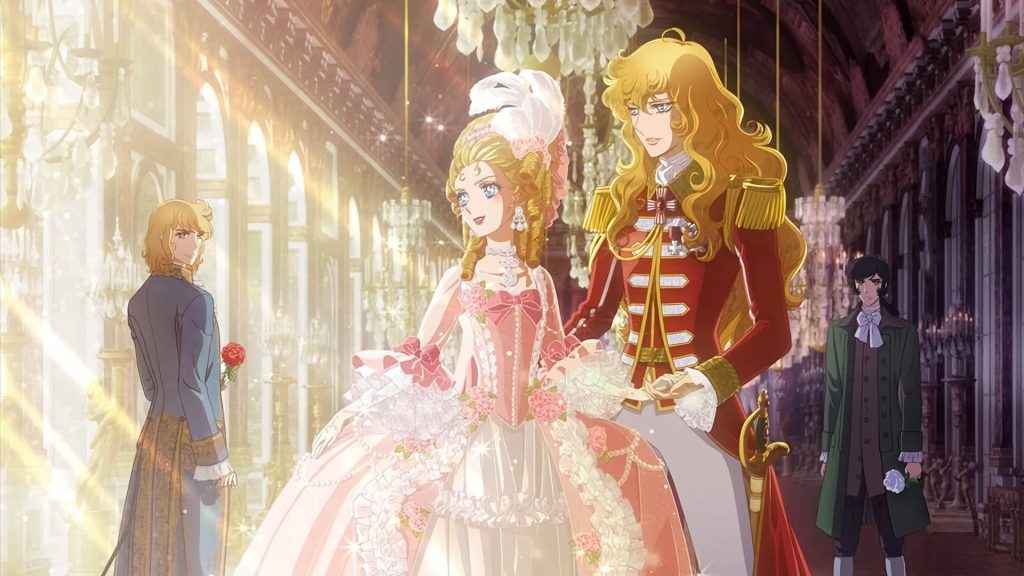
The Rose of Versailles is a Japanese animated historical romance film based on the 1972 manga of the same name by Riyoko Ikeda. Several adaptations have been made of the manga, including an anime series, other animated films, a live-action film, a musical and a video game as well.
The movie is set in 18th century France before and during the French revolution, and focuses primarily on the perspectives of two women, Marie Antoinette and her protector Oscar Francois de Jarjayes. Oscar, raised as a boy to succeed her father as the Commander of the Royal Guard is tasked to protect Dauphine Marie Antoinette upon her arrival to France. While (unfortunately) the story doesn’t include queer romance, it does include queer themes like gender identity, particularly from Oscar’s point of view.
As someone who is quite the fan of anime movies, when I had first heard of The Rose Versailles, which was advertised as a romantic historical drama, I was excited. My anticipation only increased when I had learnt that the studio producing it was MAPPA, whose repertoire includes Yuri!!! on Ice, Kakegurui, Jujutsu Kaisen and Chainsaw Man. This studio is known for its stunning and fluid animation quality, especially in recent years with the latest season of Jujutsu Kaisen. Needless to say, my expectations were high.
After watching the movie however, I was left feeling somewhat disappointed. The pacing of the story felt rushed and disjointed at times. As if they’d tried to cut it up and glue it together again in a coherent way and not quite succeeding at it in some cases. Then again, this film is an adaptation of a manga, which has 14 volumes in total, so condensing it to an almost 2 hours long movie would obviously require cutting a lot of details out of it to fit into the new format. Regardless, I still felt like certain scenes and some context clues were missing that were needed to make the story feel satisfying. This film is also a musical and whilst the songs are great, they are used way too often to advance the already rushing plot, and unfortunately, this is a detriment to the emotional scenes after a certain point.
In the end, this movie left me craving for more. More about the characters and their lives, their relationships and how they had developed. Frustratingly, many of the distinct characters were not utilized at all; we get a scene that introduces them, only to forget about their existence later. In the beginning, Marie Antionette seemed so important on a level such as the role of main protagonist would beget, but by the half-way point, she became less and less significant. She doesn’t even get a conclusion at the end, and even though we’re all aware what happens to her, it would’ve tied up her role much better. Her love interest, Hans Axel von Fersen’s relevance lasts only until the climax of their romantic plot, and from then on, he only gets mentioned once in the second half of the movie. Although Andre Grandier, Oscar’s attendant and childhood friend, felt less like his own person and more of a background character in Oscar’s life, he still managed to achieve his set goals in the end. Good for him. The character that had a compelling and relatively complete storyline was Oscar and even hers barely met the mark. Given the fact that the movie supposedly had two protagonists and two secondary ones, it was a bit unexpected, and frankly, jarring to only have Oscar’s and Andre’s storylines end properly.
What I honestly can’t complain about is the animation. MAPPA is the gift that keeps on giving when your eyes need something pleasing to look at. The characters’ designs were distinct and memorable, their colour palettes were vibrant, but not headache inducing and I especially loved the androgynous appearance of Oscar. The fight scenes were short, but nicely choreographed, and none of them felt repetitive in their sequences.
The voice acting in this movie deserves praise as well. Miyuki Sawashiro as Oscar was a treat, the actress’ voice fit Oscar to a T and admittedly, her emotional scenes made me tear up at times. Aya Hirano as Marie Antoinette truly embodied the innocence of the young queen-to-be and the maturity and dignity of the older Queen of France. That’s not to say the rest of the cast didn’t meet the mark, because they absolutely did. The two male love interests’ actors, Kazuki Katō and Toshiyuki Toyonaka as Hans Axel von Fersen and Andre Grandier respectively, were nothing short of fantastic. As this film is also a sort of musical, the songs were a standout. The film features 15 insert songs composed and arranged by Hiroyuki SAWANO and sung by the voice acting cast. I enjoyed the entire soundtrack, but my favourites were The Rose of Versailles, Child of Mars and Believe in My Way.
With all that said, I still recommend watching The Rose of Versailles, because it is visually gorgeous, the songs are still great and even though the structure of the plot leaves a lot to be desired, the film makes you feel something, whether it’s negative or positive. And really, that is what art is for, to make you think and to make you feel.
Picture source: Official Movie Cover on Netflix 2025
